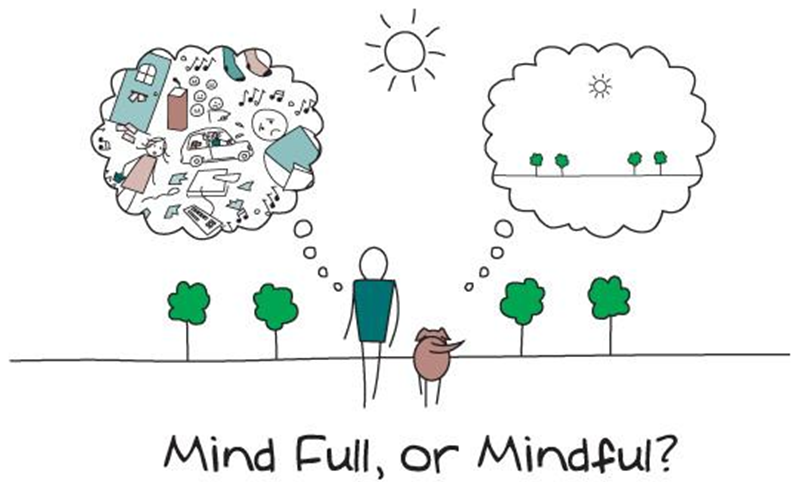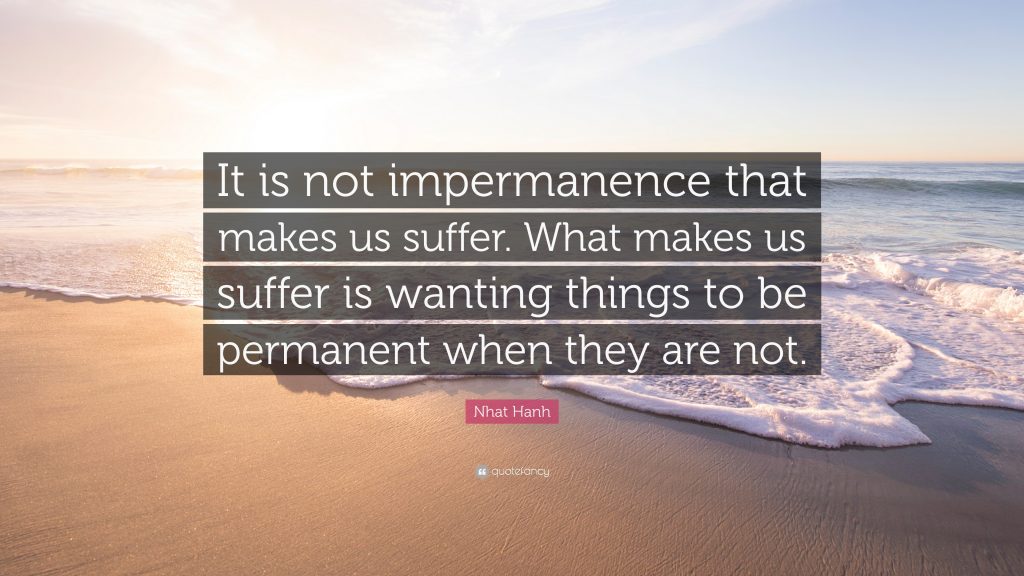
This book sets out to tell you how to relate to life’s adversities, especially to those little things that we let grow inside us until they become a big deal.
For a good part of it, I was unsure whether I was going to give it three or four stars, the reason being that I mainly liked it, because I believe the advice is very effective and practical, but, at the same time I felt it was lacking something.
In fact, this book helps you to cultivate your well-being by saying what to do, however, it doesn’t mention, or least makes it clear, how to do it.
I think the book refers to the same principles as that of mindfulness, although if someone doesn’t know what that is, they might just roll their eyes when reading this book.
This is exactly what I did when I started to read this book in 2018 and then left it for the same reason.
I thought of mindfulness as something to “clear your mind”, something esoteric reserved to holy people only. Now that I can instead understand better what mindfulness is (thanks to these reads: A Monk’s Guide to Happiness, Wherever You Go There You Are, The Wisdom of No Escape, Ego Friendly, amongst others), I can appreciate what Richard Carlson is talking about in his book.

It’s easy to misunderstand this image – it seems like mindfulness “clears your mind” but that’s not what it is – instead, it’s focusing on the present moment and therefore seeing things as they are now.
To use Thomas Hobbes’ words;
“only the present has an existence in nature; past things exist in the memory only; and future things don’t exist at all, because the future is just a creation of the mind, arrived at by noting the consequences that have ensued from past actions and assuming that similar present actions will have similar consequences“.
The subtitle of the book “and its all small stuff” didn’t excite me, and although I understand what it wants to convey, I think this is dismissive and not helpful to put it as a (sub)title. When you have strong feelings about something, you don’t consider it “small stuff”, and saying that it is, doesn’t help – it produces quite the opposite effect because it makes you feel the other one is not understanding what you’re going through.
So for the reasons above I decided for three stars. My rating was definitely confirmed when I read the section about “Remember that everything has God’s fingerprints on it“. I wasn’t expecting the religious factor to appear like that, all of a sudden, without any previous warning to the reader. This “surprise” made me feel uncomfortable.
However, this book made me think a lot and this is something that makes a book a good one in my eyes, so I’m glad I picked it up again from when I stopped reading it back in 2018.
In Conclusion
There’s some great advice in this book about how to live with less stress. It’s a perfect book for busy people because each of the chapters is short enough to make its point effective.
I think it would have been more complete had it clearly indicated what the tool to put in practice the advice is, which in my opinion is mindful awareness – i.e. train your mind how to relate with your thoughts and emotions.
Overall, a good read that I recommend.
Some of my favourite quotes from the book:
Make peace with imperfection.
Be aware of the snowball effect of your thinking.
Remind yourself that when you die, your “In Basket” won’t be empty.
Often we convince ourselves that our obsession with our “to do” list is only temporary – that once we get thorught the list, we’ll be calm, relaxed, amd happy. But in reality, this rarely happens. As items are checked off, new once simply replace them.
Don’t interrupt others or finish their sentences.
Ask yourself the question: “Will this matter in a year from now?“
Surrender to the fact that life isn’t fair.
Surrender that life is not fair and rarely is the way we want it to be and people don’t act as we would like them to.
Allow yourself to be bored.
People are no longer human beings. We should be called human doings.
Lower your tolerance to stress.
Our current level of stress is exactly that of our tolerance to stress. So when your schedule is getting out of your hand, it’s a signal that it’s time to slow down and revaluate what’s important rather than power through everything on the list.
Imagine yourself at your funeral.
(This is also the “Second habit” – “Begin with the end in mind” that I read about in “The 7 Habits of Highly Effective People” by Stephen Covey)
Repeat to yourself, “Life isn’t an emergency“.
(How this applies to my life! – To be reminded together with “when you die, your “In Basket” won’t be empty“).
It’s easy to allow my mind to slip into various form of negativity. When I do, the first thing that leaves me is my sense of gratitude.
Seek first to understand.
(This is also the “Fifth habit” – “Seek First to Understand, Then to Be Understood” that I read about in “The 7 Habits of Highly Effective People” by Stephen Covey)
In low moods we loose our perspective.
When you are in ill mood, learn to pass if off as simply that: an unavoidable human condition that will pass with time, if you leave it alone. A low mood is not the time to analyse your life. To do so is emotional suicide. The next time you feel low, for whatever reason, remind yourself, “This too shall pass“.
Life, like an automobile, is driven from the inside out, not the other way around.
It’s the same concept as the title of the book “Wherever you go there you are“.
Do one thing at a time.
(This piece of advice looks too simple but in my experience is very effective).
There is no way to happiness. Happiness is the way.
Problems come in many shapes, sizes, and degrees of seriousness, but all have one thing in common: they present us with something that we wish were different.
When we accept our problems as an inevitable part of life, when we look at them as potential teachers, it’s as if a weight has been lifted off our shoulders.
Blaming others makes you feel powerless over your own life because your happiness is contingent on the actions and behaviour of others, which you can’t control.
When you stop blaming others, you will see yourself as a choice maker.
Whenever you expect something to be a certain way and it isn’t, you’re upset and you suffer. On the other hand, when you let go of your expectations, when you accept life as it is, you’re free.
Unhappiness is the result of struggling against the natural flow of experience.
(Which is what is strongly stated in “A Monk’s Guide to Happiness” too).

The root of being uptight is our unwillingness to accept life as being different, in any way, from our expectations. Very simply, we want things to be a certain way but they’re not a certain way. Life is simply as it is. Perhaps Benjamin Franklin said it best: “Our limited perspective, our hopes and fears become our measure of life, and when circumstances don’t fit our ideas, they become our difficulties“.
Learning to be satisfied doesn’t mean you can’t, don’t, or shouldn’t ever want more than you have, only that your happiness isn’t contingent on it.
As thoughts of what would make your life better enter your mind, gently remind yourself that, even if you got what you think you want, you wouldn’t be one bit more satisfied, because the same mindset that wants more now would want more then.
Title: Don’t Sweat the Small Stuff… and It’s All Small Stuff
Author: Richard Carlson
Year first published: 1997